When it comes to our region’s multi-use paths (known by wonks as MUPs), it’s not a stretch to call the I-205 path the “Granddaddy” of them all. Built by the Oregon Department of Transportation with money from our heralded “Bicycle Bill” (that mandates 1% of new highway funds go toward bicycling), the first section of the path opened in the 1970s and it was “completed” in 1982. Today the path connects five cities, ten neighborhoods, and stretches 16.5 miles from the Clackamas River in Gladstone to Vancouver, Washington.
Last night, staffers from ODOT and TriMet led a Pedalpalooza ride (sponsored by the Women’s Transportation Seminar) that gave attendees a chance to learn more about the path’s past, present and future.
Before we got rolling, it was fun to hear the reasons why each person showed up on a weekday evening for a wonky tour of the I-205 path. “This was the closest Pedalpalooza ride to me tonight,” said one guy. Another guy said, “I do all of the wonk rides.” We were also joined by a a married couple named Michael and Wendy. Wendy shared that they live just one block off the path. “I love having this path next to our house,” she said, “because I could re-learn how to ride a bike without cars scaring the crap out of me.”
We began at the Gateway Transit Center where TriMet active transportation planner Jeff Owen shared his agency is working with the Portland Bureau of Transportation on the East Portland Access to Transit project. Among other things, that effort will result in more bike parking at Gateway as well as a new bikeway that will connect east Portland, through the transit center, and onto the I-205 path.
We then rolled north for a stop at the future site of the Gateway Green bicycling and activity park. Neighborhood activist Linda Robinson has been working to make that project a reality since 2006. She told us they’ve now gotten the green light to start building; but they need to raise money. A fundraising campaign is set to start later this summer. (Stay tuned for more).
From Gateway Green, we rolled south and it didn’t take long before we saw just how bad many parts of the I-205 path are. The crossing of NE Glisan St. is atrocious. The path narrows and then is directed into a crosswalk that goes across six lanes of chaotic auto traffic. Then it’s up onto a sidewalk before the path starts again. I hoped we would stop at this intersection to discuss this glaring gap; but the ODOT staffer on the ride — Transit and Active Transportation Liaison Jessica Horning — conveniently kept riding. The only thing Horning said about the Glisan crossing is that, “We have partnered with PBOT to tried and figure out a solution.”
One crossing south of Glisan is another unfortunate intersection: Burnside. Here, riders must cross two sets of MAX tracks at an awkward angle while avoiding large metal bollards and then ride up onto another sidewalk before rejoining the path on the opposite (east) side of I-205. We didn’t stop to talk here either.
Then it was onto yet another less-than-great crossing: the SE Stark and Washington couplet. Here the path is once again routed into a crosswalk then onto a narrow sidewalk before rejoining the path. We didn’t stop to talk about this section either.
Finally, at SE Yamhill, Horning stopped the group to have a chat. She pointed out something rather interesting: two diamonds in the path just north of Yamhill are some of the oldest automated bicycle counters in the country. Horning shared that these inductive loops (which sense the metal in your bike and count each one that rolls over) were installed in 1982. They provided data for a few years, but then in the late 1980s, Horning said they fell victim to politics during a period of waning ODOT support for cycling and they were turned off. The good news is, they were turned back on about year ago and are once again providing accurate bicycle counts. So far, the highest date on record is August 19th 2012 when 592 bicycles rolled by. On average there are about 250 bicycles counted on this section of the path.
From Yamhill we continued south to the crossing of SE Division where we got an up-close look construction of the new undercrossing. This new section of trail will give folks the option of avoiding Division Street altogether and it’s slated to be done by this fall.
Also at the Division stop, ODOT community affairs staffer Shelli Romero told us about new wayfinding signage ODOT has installed to make the path a bit easier to navigate
At the SE Powell MAX station we heard about TriMet’s public art program and bike parking. Jeff Owen explained that for $25 per six months (and a $50 key deposit), you can gain access to any of the bike lockers at MAX stations all along the Green Line. As we stood under the “Money Tree” sculpture by Valerie Otani, Owen explained that there each Green Line stop has work from a different artist and each piece is meant to evoke something about the area’s cultural history.
Our final stop on the ride was one of the most egregious gaps on the path. It’s not as dangerous or clunky as Glisan; but the “horseshoe” route the path takes just north of Flavel (and south of the Springwater Corridor intersection) is really unfortunate. Instead of just hopping over Johnson Creek to reach the Flavel MAX Station on the other side, the path heads east to the signal at SE 92nd and Flavel before turning back (west) to the path (via a sidewalk) at the MAX station. We heard from ODOT facilities manager Basil Christopher that at least there’s something being done about this gap. ODOT has gotten a bridge project on the state’s official project list. The list hasn’t been finalized and public support is still needed to help make sure the funding comes through.
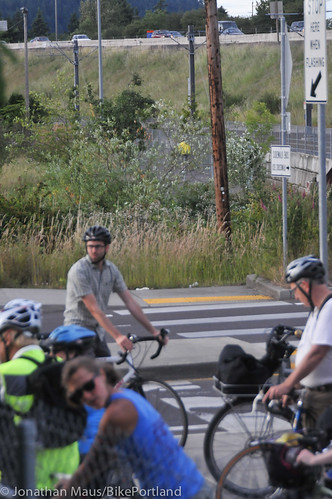
The little yellow spot in the background is a person riding on the path.
The I-205 path is a crucial connection for our bike network. In east Portland, where most of the roads are uncomfortable for cycling, it has even more value. Unfortunately, even though it’s been around for 30 years, unacceptable gaps and dangerous spots still exist. There’s also quite a bit of glass and trash in many spots. Yes, progress is being made, but it seems like there could be more urgency to make this path a real — and fully connected — bicycle corridor.
Hopefully at future Pedalpalooza rides, we’ll get to explore all the great new improvements that have been made. Until then… let’s keep pushing to make it better!



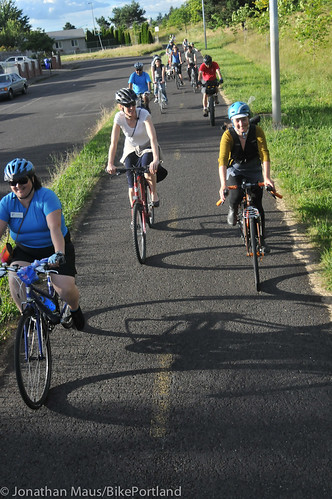
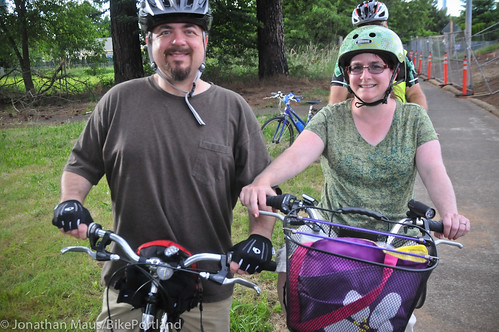
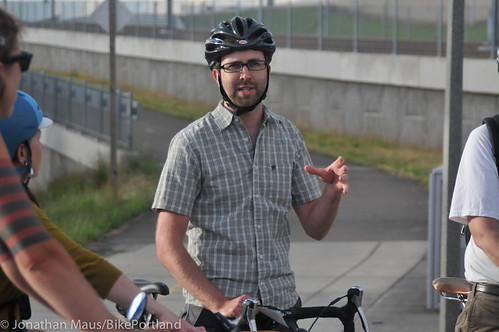
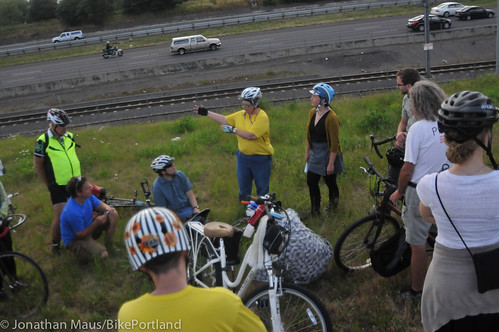
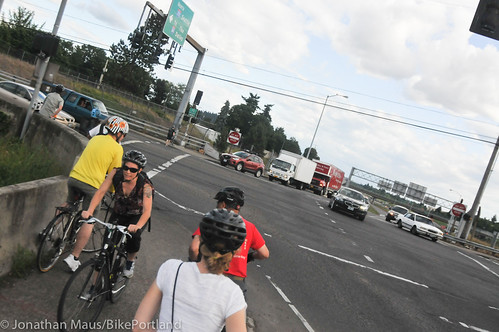
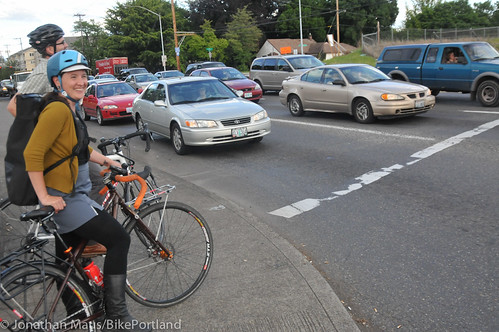
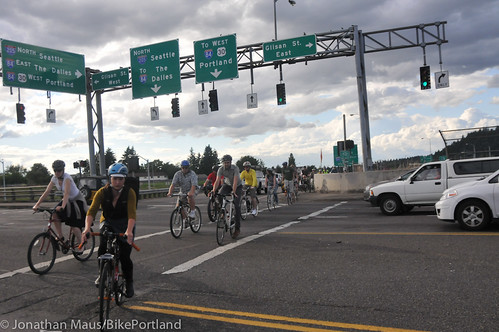
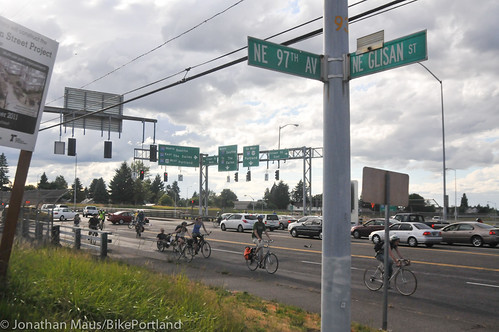
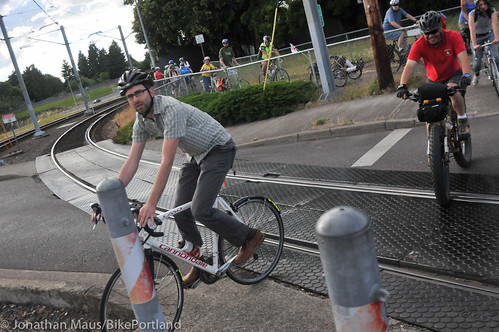
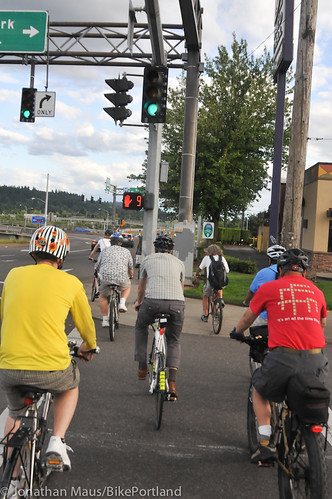
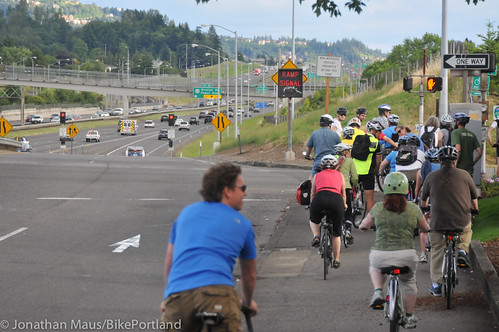
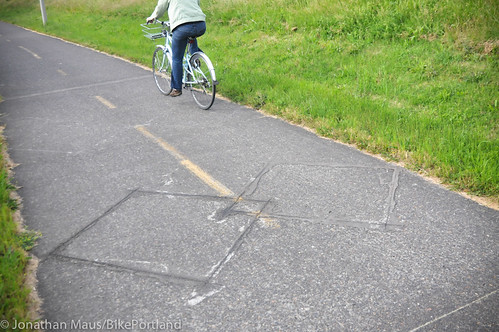
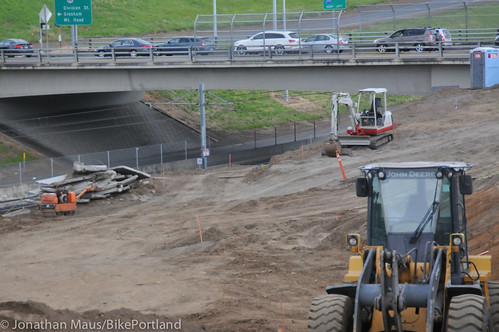
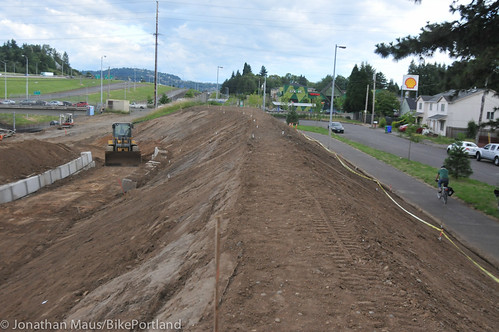
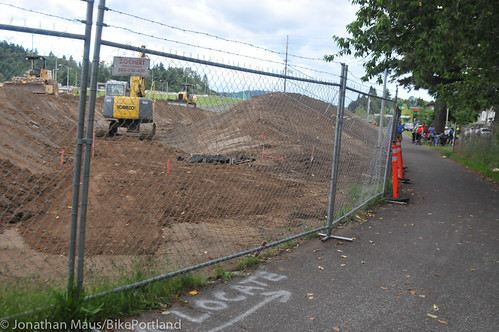
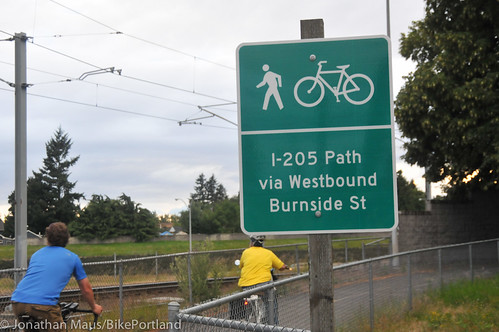
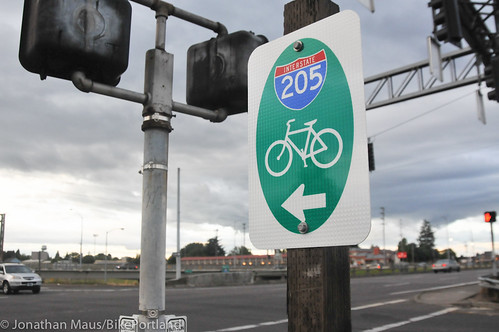
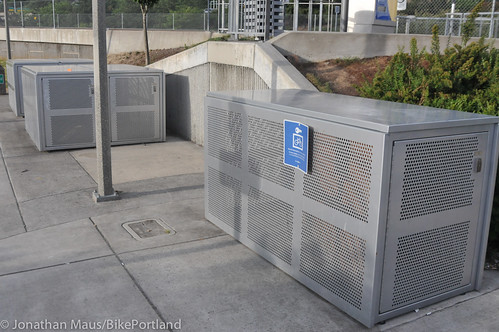
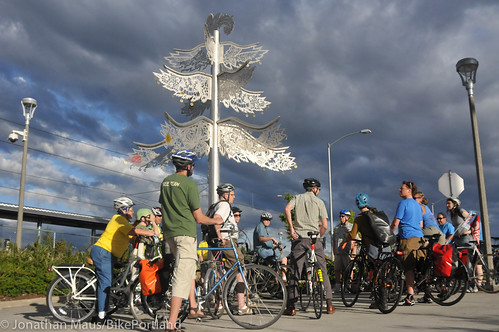
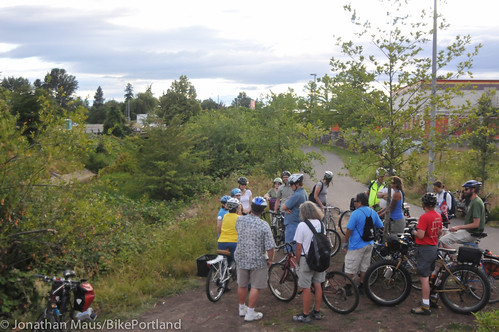
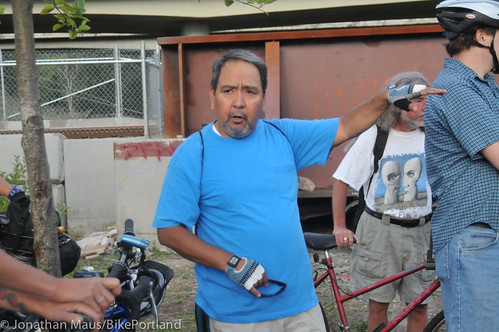
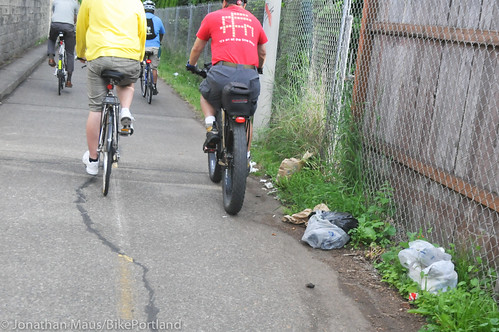
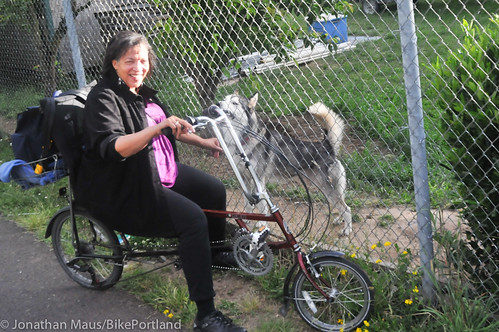
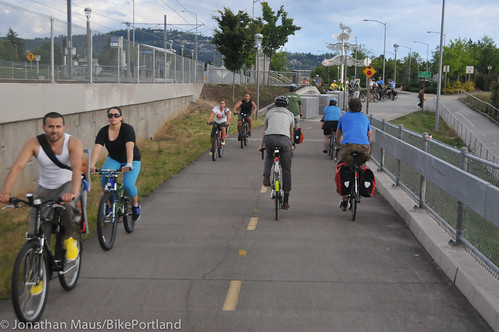
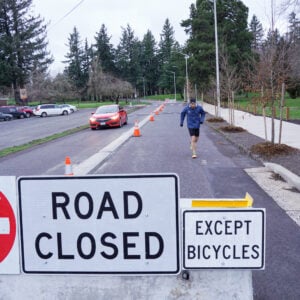

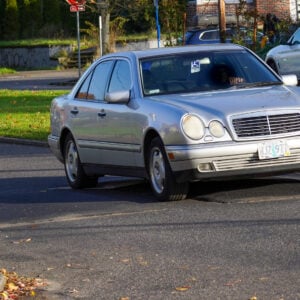

Thanks for reading.
BikePortland has served this community with independent community journalism since 2005. We rely on subscriptions from readers like you to survive. Your financial support is vital in keeping this valuable resource alive and well.
Please subscribe today to strengthen and expand our work.
Great report! I could not agree more with your assessment on the crossing at Glisan. I used to live right there and truth be told it is not only terrible for bikes, but it isn’t so great for cars either.
I’ve surprised hookers servicing johns in the parking area just off the MUP south of Glisan, but it seems to have gotten slightly better since the area was redone a couple years ago (last year?)
What I find most discouraging about the 205 MUP is the large amount of broken glass on the pavement. But I suppose this has something to do with the large number of homeless camps along the path.
The worst I’ve seen is actually at the Glisan crossing, where auto accidents tend to happen at that freeway entrance. Glass gets thrown onto the sidewalk then never cleaned up by the tow crews who come to take the cars away.
Too bad the ride stopped short of the worst “gap” of all. The south bound trail goes onto sidewalk at 82nd dr. and doesn’t become trail until south of Webster @ I-205. Sidewalk riding, narrow road, gravel, wide trucks and crazy crossings this section has it all.
The actual riding on 82nd isn’t even that bad. The sidewalk ride to get there, and then rejoining the path is just insane.
The bike lane is to the left of a right turn lane, except signage is poor… you need to be in the right turn lane. A small bike lane puts you on a sidewalk where you wait for a signal. 20 feet later, you wait for another signal. Then you basically do the reverse on the other side.
In order of terribleness.
Southern end of the gap.
Flavel and that sidewalk ride at Crystal Springs
Glisan actually, several others are worse than Glisan.
The Flavel gap, while not ideal is actually not horrendous, as you can just jump into the bike lane on 92nd and ride that until you reach the connection on the west side of the street. Again, not ideal, but I found it to be much easier than trying to get on the path south of Flavel, only to end up back crossing 92nd.
Describing the “horseshoe” at Flavel, you got east and west mixed up. The creek crossing is west of the main trail.
I passed the ride last night heading the opposite direction, just north of Powell.
My partner got super lost at the “Flavel horseshoe” on his first time biking to work from SE Portland to Clackamas Town Center on the 205 path. He ended up taking the MAX down instead – not a fun surprise at 5:30AM.
If this path is our MUPs’ grandaddy, maybe it’s time for some surgery to improve the parts that aren’t working so well on ol’ pops….
A better summary of the ODOT projects under consideration for funding in this area can be found at the ODOT Region 1 web site: http://www.oregon.gov/ODOT/HWY/REGION1/Pages/stip/index.aspx
There are projects in both the Fix-It and Enhance categories. Now is the time to comment on which projects should be prioritized for funding.
I live in the area – on 72nd near Duke – and agree that the worst gap is where the path picks up at 212/224 again after riding 82nd Dr, and then at the end where it rejoins 82nd before you cross the Clackamas and head into Oregon City. It seems to me easier to just stay on 82nd Dr by that point.. As for the Flavel “horseshoe,” I find it easier to take 92nd down to SE Crystal Springs and simply rejoin the path there since it is broken again by 92nd right before that anyway.
The northern crossings at Glisan, Burnside, Killingsworth (which I am surprised no one has mentioned yet, maybe because the ride did not tour here), and Marine Drive could definitely all use some reworking to make for less confusion and more safety. There also seems to be a lot of stopping for these crossings by comparison to the long sections of the Springwater which really breaks up the pace of a longer ride, though this is maybe a bit less important than the safety issue. There are also some nasty tree roots at the north end of Maywood Park which need to be addressed. Overall, the path serves its purpose but definitely shows its age and era of design.
At least a huge chunk of it isn’t still closed like it was when they were building the green line, anyway.. Still, looking forward to the division bypass. It is nice to be separated from auto traffic, but much of it still gets a lot of noise from the highway which is rather unpleasant. If I had to grade it by today’s standard, it’d probably be a solid C, maybe C+ at best. By comparison, I would give the Spingwater a B+, even without its completing segment through Sellwood.
Marine? The 205 path is on the bridge by then.
We must be neighbors, I’m at 75th and Duke.
I will again say that I am a little disappointed that money is being spent on the Division underpass, when it is no where near as problematic as Glisan, Burnside, Killingsworth, etc…..
I’m a little torn about the Division crossing in this regard. Yes, it’s probably a bit easier than Killingsworth and Glisan, but arguably is less safe because two lanes of unsignaled traffic must stop in both directions. It’s not uncommon, for example, to see cars in the right lane stop only to have some impatient DB pull into the left lane and speed past them, almost hitting whatever poor soul is trying to cross the street. I have almost been hit there twice in the past year, whereas I’ve never had a near miss at Killingsworth or Glisan..
I wanted to add too, that I do like the way the path was redone to cross Powell and Foster without any real problems. At least they got that right.
Interesting, I’ve never had a problem at Division but have almost been hit a few times at Glisan. n’s of one, right? I’ll take the underpass, but don’t understand how it was more of a priority than the other intersections (Although I imagine money/cost had something to do with it……).
I used to regularly cross Glisan NB on the 205 during my commute home. I made it a point to get off my bike and walk that intersection. Even doing that I often faced close calls from drivers turning right on Glisan on the green light. And if they didn’t do that, they blocked the crosswalk on the north end. So glad I don’t have to deal with that anymore.
Oh, and I mean crossing Marine Drive to get to that path from the 205 path kinda sucks too, especially when traffic is heavy and no one wants to stop.
i’m glad to know what those diamonds are! i had always hoped they were signaling stark to turn green, but counters are even better. one thing they could do to improve the stark/burnside connection is to time the light so a bike can cross both stark & burnside on one light cycle.
I ride the 205 path at least once a week , but only go south from either Stark or Main …when JM announced the Division underpass, I thot it was unneeded . Last time I crossed it, was next to a guy in a powered wheelchair …we got across 1 lane, but in the second .. a lady in minivan with cell phone came sailing right past like she owned the road ..about a 6 foot near hit. Now, yes ..IMHO the underpass IS needed.
And the crossing of 92nd (right under the MAX overpass) is kinda sketchy . Cars coming North are rolling down a good hill , usually pretty fast, and there is no light , only traditional painted lines. I’m slow there since crossing means starting, heading a little uphill , from a stop.
In the North section of the path between Prescott and Sandy, on the way to/from Marine Drive, the path ends and riders have to somehow know how to get back on. Short of a real connection, some better signage to direct riders back onto the path would be helpful. I’ve seen more than one confused rider pop out there and not know what to do.
I rode the 205 path 2 to 3 times a week from the Springwater junction across the 205 bridge to Vancouver in 2006/7. I finally ditched most of it and just rode up 92nd to Stark, avoiding most of those bad spots. I do the same going south, riding 92nd until meeting the trail at Crystal Springs. The 205 path is awful.
Very good example of bike infrastructure built in the 70s and 80s. Its like this all over the country….a good job where its easy, but zero effort and planning where it matters most (intersections).
which is why I hate it… unfortunately it’s the best north-south path in the area…
On the plus side though, the bridges over Foster and Powell are quite nice!
Thank you so much for a thorough report.
The bike counts in the hundreds makes me want to take Bowie Vs. Prince Vs. Morrissey over that counter and break the record.
Yeah, I recently biked from Gateway to my house in Sellwood via the 205 path and Springwater. It was both very impressive and underwhelming, all at the same time.
Primarily, as Jonathan hinted, the intersections and street crossings are HORRENDOUS! The path itself is nice. But man, do those connections suck. A couple of times I almost rode right out onto a busy street, because there were no bicycle stop signs (!). And I’m a seasoned cyclist, with 27 years of riding under my belt.
To make it good, I suggest re-engineering EVERY instance where the path crosses any sort of street, and apply uniform bike engineering standards. When they are different, it makes it confusing. Ie, going from a sidewalk to crossing using a useless HAWK signal, then not even a crosswalk, etc, is really bad.
Did you really not see the cross street completely?
I ride SpringWater 2-3x a week from se136th to Ochoco. The diagonal crossing at Bell Station has been a blessing. (except for the occasional illegal right turner)
Was just the other day thinking that such a crossing would be great at the Flavel & 92nd intersection since nobody that I’ve seen uses the actual 205 MUP to get to the rejoin point by the overpass. 92nd gets used by most since it’s more direct.
this would really smooth out those problems on 205 MUP
Flying bike unveiled in Prague
http://www.reuters.com/video/2099/01/01/reuters-tv-video?videoId=243330835
As an update to this article: the north-south Glisan crossing now has countdown cross-walk signs rather than the flashing hand and the Division underpass is now open and it’s a great addition to the path. Now if they could only do something like that at Glisan!